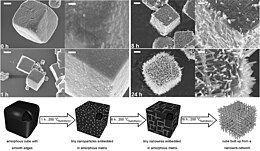
Back تنظيم ذاتي Arabic Autoorganització Catalan Samoorganizace Czech Selbstorganisation German Αυτοοργάνωση Greek Autoorganización Spanish Iseorganiseeruvus Estonian خودسازماندهی Persian Itseorganisoituminen Finnish Auto-organisation French

| Complex systems |
|---|
| Topics |
Self-organization, also called spontaneous order in the social sciences, is a process where some form of overall order arises from local interactions between parts of an initially disordered system. The process can be spontaneous when sufficient energy is available, not needing control by any external agent. It is often triggered by seemingly random fluctuations, amplified by positive feedback. The resulting organization is wholly decentralized, distributed over all the components of the system. As such, the organization is typically robust and able to survive or self-repair substantial perturbation. Chaos theory discusses self-organization in terms of islands of predictability in a sea of chaotic unpredictability.
Self-organization occurs in many physical, chemical, biological, robotic, and cognitive systems. Examples of self-organization include crystallization, thermal convection of fluids, chemical oscillation, animal swarming, neural circuits, and black markets.
- ^ Betzler, S. B.; Wisnet, A.; Breitbach, B.; Mitterbauer, C.; Weickert, J.; Schmidt-Mende, L.; Scheu, C. (2014). "Template-free synthesis of novel, highly-ordered 3D hierarchical Nb3O7(OH) superstructures with semiconductive and photoactive properties" (PDF). Journal of Materials Chemistry A. 2 (30): 12005. doi:10.1039/C4TA02202E.